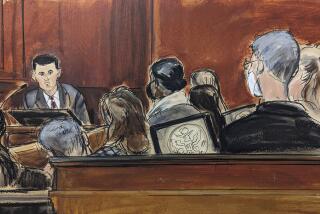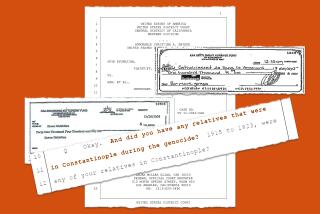Executive Life Fraud Trial Goes to Jury
- Share via
An attorney for French billionaire Francois Pinault told jurors Monday that his client’s nationality shouldn’t play a role in deciding whether Pinault committed fraud during the complex financial dealings that followed the collapse of Executive Life Insurance Co. in 1991.
“This case is not about the French,” attorney Robert Weigel said during closing arguments of the trial, which began two months ago in U.S. District Court in Los Angeles. The state alleges that Pinault, 68, was part of a conspiracy to hide the role of French banking giant Credit Lyonnais in the purchase of the assets of California insurer Executive Life.
Weigel, saying appeals to prejudice have no place in the courtroom, pointed to earlier testimony by state Insurance Commissioner John Garamendi. Garamendi, who engineered the original Executive Life deal, testified that if he suspected fraud, he would have told Pinault: “Goodbye, go back to France, get out of here.”
Gary Fontana, who is representing Garamendi in the case, denied that the state had tried to appeal to any anti-French sentiment.
“This is not a case about whether Mr. Pinault is French,” Fontana told the jury, which began deliberations late Monday. “This is a case about whether Mr. Pinault lied.”
In a complex case filed six years ago by then-Insurance Commissioner Chuck Quackenbush, the state Department of Insurance alleges that Pinault’s purchase of about $2 billion in high-yield bonds once held by Executive Life was part of a scheme to conceal a deal that allegedly gave Credit Lyonnais control of Executive Life in 1991.
Garamendi contends that he never would have approved the arrangement had he been aware of secret “portage agreements” between some of the parties. The Executive Life purchase, the state argues, violated state law that prohibited foreign governments from controlling a state- licensed insurer.
The state, which is seeking about $1 billion in damages and interest from Pinault, alleges that his holding company Artemis was created in 1992 as a way for Credit Lyonnais to unload the assets when federal banking regulators began asking questions about the bank’s role.
“The bank needed an exit strategy, and they decided Mr. Pinault was their man,” Fontana said in his closing argument. “No one, no matter how rich or how powerful, is above the law.”
On Monday, Weigel argued that Pinault had no part in a conspiracy and was only an entrepreneur looking for a good investment. Artemis was created after the assets had already been sold by Garamendi, Weigel said.
Pinault -- the fourth-richest person in France, according to Forbes magazine -- is a colorful figure who controls an empire that includes world-class brands such as Gucci, Yves Saint Laurent and Christie’s auction house.
Pinault’s lawyers argued that there was no way Garamendi and the state could not have known that Credit Lyonnais was behind the group that bought Executive Life, and they pointed out newspaper and magazine articles from the state’s own files that stated Credit Lyonnais’ role.
“The time has come to end six years and two months of senseless litigation, right here, right now,” Weigel said. “What we have not heard in eight weeks of testimony is a single witness saying there was a conspiracy.”
The lengthy case included 1,800 pieces of evidence and more than 40 witnesses, some of whom needed interpreters.
Because of the case’s complex financial terms, both attorneys on the closing day of the trial seemed to reach for anecdotes the jury could relate to:
Fontana, in his closing statement, quoted Joe Friday, the detective from the television show “Dragnet.”
James Clark, another attorney for Pinault, quoted “Alice in Wonderland” and artists such as Salvador Dali and Georges Braque, saying the state had built a case that asked the jury to “believe impossible things.”
More to Read
Inside the business of entertainment
The Wide Shot brings you news, analysis and insights on everything from streaming wars to production — and what it all means for the future.
You may occasionally receive promotional content from the Los Angeles Times.










